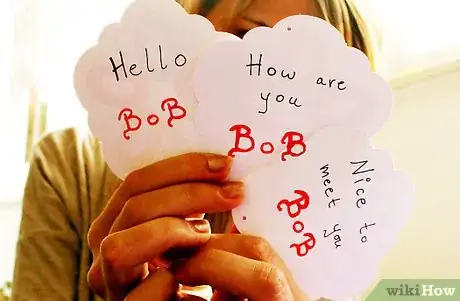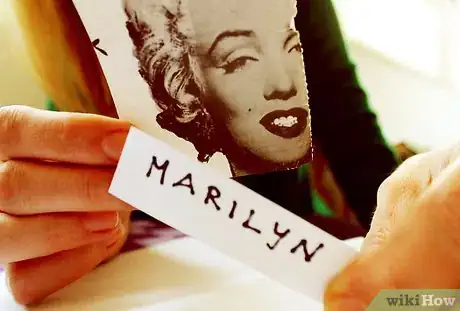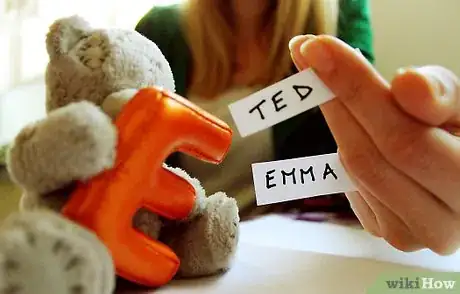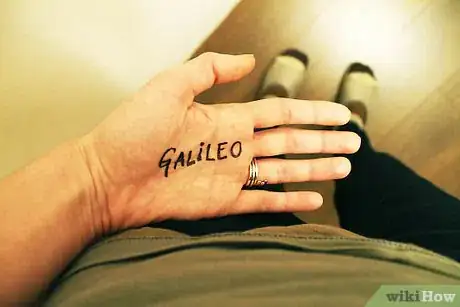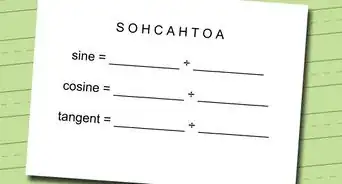wikiHow is a “wiki,” similar to Wikipedia, which means that many of our articles are co-written by multiple authors. To create this article, 40 people, some anonymous, worked to edit and improve it over time.
There are 7 references cited in this article, which can be found at the bottom of the page.
This article has been viewed 268,798 times.
Learn more...
Having problems remembering people's names? It happens to almost everyone from time to time but if it's a frequent issue for you, it's time to address what has become a bit of a bad habit. If you're shy, nervous, bored, or facing people who awe you, these can all feed your name forgetfulness but they're no excuse; there are ways to remember names. Using a person's name is a key to opening doors for you and to maintaining an initial rapport that could make this person a new friend for life or a lifelong business partner. Make the decision to start remembering people's names from today!
Steps
-
1Understand the importance of using another person's name. Sometimes it can help to see the results of using a name rather than focusing purely on your nervousness, skittish memory, or simple lack of willpower to remember another's name. William Shakespeare once said: "There is no sound so sweet as the sound of one's own name" and he was spot on – using another person's name creates a connection and is a form of acknowledging them as being special and valued.[1] It makes the encounter meaningful for the other person (and for you too) and it helps them to feel good that you have acknowledged them. Ultimately, remembering a person's name is about being polite and considerate; moreover, first impressions count considerably and you may not get another chance to make a solid and likable impression.
- Bear in mind how you feel when someone forgets your name; nobody likes to be forgotten![2]
-
2Be aware that the most common reason for not remembering names is actually very simple. It is usually because you're not actively listening, or not paying adequate attention.[3] Much of this can stem from nerves and worry about the kind of impression you're making on the other person.[4] The answer is to give the person your full attention when you're introduced to them, and to focus on them, not on yourself. If one of the reasons that you find it hard to remember another person's name is because you're nervous and so busy worrying about a topic of conversation, then you'll probably benefit from spending a brief but useful time learning about how to make small talk so that you can be truly "present" when introduced to others and can hear their names distinctly. wikiHow has some excellent choices for you to begin with:Advertisement
-
3Ask for the name again if you don't hear it correctly the first time. Nobody expects you to make a large pretense of knowing the other person's name if you didn't actually hear it when it was first said. Seize the moment though – be sure to say that you "didn't catch" the name, or something similar, straight away. This clarifies that the name needs to be said again, perhaps more clearly or slowly. Listen well this second time! This is a good trick to use if you were overwhelmed by nerves, noise, movement, or whatever else has distracted you; you will usually be aware that a name has been stated and you should use that awareness to immediately apologize for not hearing and asking for the name again.
- If you do not understand how to say the person's name, this is the perfect opportunity to ask the person to repeat it and then repeat it out loud yourself.
- If the name is unusual, ask the person to spell it, if that doesn't annoy them, and perhaps even ask where it originated from.[5] Be prepared to do the same if your own name is unusual and hard to spell or say.
- If appropriate, exchange business cards with the person, and have a good look at the name.
-
4Use repetition. Repeat the person's name when you're introduced, such as: "Pleased to meet you Verity". Do this slowly rather than quickly, to make it clear and use the pause in the introduction to also smile and show that you're genuinely pleased to meet this new person.[6] Use their name early on in the conversation, such as in ends of your statements or questions. For example, say "I was wondering how you found the dinner this evening, Verity?". Repetition (use of the name at least three times) will help you remember, as the look and sound of the name will make its way into your memory.
- Say the person's name at least ten times in your own head when you're informed of it.
- Example of some things to say with the person's name involved: "What are you planning to do next year, Theresa?", "How did you feel about that, Fred?", "It was a pleasure meeting you, Elisa". (Using it when you say goodbye is an excellent way of cementing the name in your mind for future meet-ups.)
-
5Make associations with the person and other people you know. Create a mental picture of this new person standing beside somebody else you already know well with the same name, or a similar name (this can even be celebrities!). When you need to remember the new person's name again, you can usually remember the mental picture you had of this person, and who they were standing with. An example: "Mark is friends with Matt", "Hilda looks like Jennifer Aniston".
- It's also easier if the new person you meet, already knows some of your friends. This way, you can ask your friend, but you will also be more likely to remember the name if you think of your friend too.
-
6Associate the name with objects or animals. There are several methods that you can employ here, depending on what works best for you:
- Find an animal or object or alike with the same letter as the person. Some examples: "Kimberly-Kitten", "Billy-Board".
- If it's a name that can naturally be associated with something visual, then make use of this connection.[7] For example, names like House, Gold, Wood, Briar, Paris, Bree, etc., can all be linked to visual images in your mind to help you recall the name.
- Associate the name with a word that it rhymes with, for example, "Terry Berry".
- Associate the name with something of similar meaning, for example, "Cliff-Mountain".
- Associate the name with what it sounds like, such as Mr Siegel becoming Mr Seagull.[8]
- Substitute words or even famous people for names that you can't associate with visual images. For example, Alyssa Freiburg could become "Alyssa Milano fries burgers" for your memory's sake!
- Obviously, keep these associations to yourself, as the person might feel offended by what they might see as a comparison rather than an association!
-
7Study the person's face or other distinctive features. Naturally, be discreet, but try to examine the person's face, hair, or other characteristics when you're talking together. Try to find something easy to remember about them, such as jagged teeth, bushy eyebrows, deep wrinkles, suave dressing, or anything else unusual or distinguishing. Try to associate the name with this feature, so that you will remember next time. An example: "Jenny with the crooked smile."
- Try to select the most outstanding feature and attach the name to that.
-
8Ask a friend or partner to help you. If you're really not getting the name thing down at all, ask your partner or some trusted friends to help you out. You can explain to them that you still can't remember names very well and would appreciate them coming to the rescue if you appear uncomfortable or use a keyword (choose one between yourselves in advance) that indicates you're floundering for a name.[9] Have them either introduce themselves immediately, or state the name of the person straight out in conversation if they already know it. Make sure you're listening!
- You can discreetly ask someone you know to help you during the conversation; just be careful to do this to the side, and discreetly. A friend or partner could also tell you the person's name, before you meet them, so that you will get more time to think about the name, thus saving it in your memory.
- Some examples: "Did you know Rick is a painter?" or "Sarah and I also discussed this yesterday".
-
9Trust yourself. It's easy to accept that you are bad at remembering names, but don't go around thinking that about yourself! You're not "Ben, the guy who can't remember names", and you shouldn't tell that to everyone you meet because in doing so you're effectively telling your own mind that it's hopeless on this count and letting other people know that you really can't be bothered trying, so they're less likely to be sympathetic with you. Commit to improving yourself, tell yourself that you can be good at remembering names.
- Think about how painful it is when someone else jumps in and says "I'm not good at remembering names" just when the same thought is on the tip of your tongue. Does that leave you feeling annoyed that they announced their disinterest in remembering your name first? It should be a wake-up call that both of you are not trying hard enough, so show that other person up by deliberately remembering their name!
-
10Write it down. While you're practicing at becoming better at remembering names, you could keep a little notebook with you (or you could use your smart phone or other phone if it accepts notes). When you talk to someone new, write their name down in your notebook. Do this immediately after you've finished talking, and you might even like to add some notes about the person's looks and personality, and where you met, in what month, etc. This way, you can look through your notes every day or week, and try to remember each entry. Example for note: "John, met him at the office in May. Tall, lean guy with glasses. Was a little condescending."
- Use apps like Nameorize or Namerick for iPhone/Android to write down the names of new people you meet.
- Don't write anything down when you're talking to them or in their presence. Wait until you are done talking, then go somewhere discrete and write a fast entry down in your notebook. It is worth doing though, as people will appreciate you taking the trouble to remember their name.
-
11Consider asking. Finally, if all else fails, own up to having forgotten the other person's name, as politely as you can. Say something like: "I'm terribly sorry, but I've forgotten your name. Would you mind telling me what it is again?" Smile and don't go into copious details or apologize too much; just treat it lightly and get on with it. The likelihood is that you won't forget this person's name again in a hurry!
Community Q&A
-
QuestionI've forgotten the name of one of my schoolmates and it's driving me crazy. School is out so I can't just ask him. I can't contact anyone he knows either. What do I do?
 Athena21Community AnswerIf you were in an alphabetical seating plan, thinking about where the person sits could help you to remember what the name could be.
Athena21Community AnswerIf you were in an alphabetical seating plan, thinking about where the person sits could help you to remember what the name could be. -
QuestionI can remember names, but when two people are together a lot, I get their names confused. Any suggestions?
 Community AnswerPick out a part of their names that matches something about them (for example, someone called Daisy, who often wears a flower in her hair). Or create a rhyme: "Fran loves her pans" for someone who likes to cook.
Community AnswerPick out a part of their names that matches something about them (for example, someone called Daisy, who often wears a flower in her hair). Or create a rhyme: "Fran loves her pans" for someone who likes to cook.
Warnings
- Don't overdo use of a person's name in conversation, or you'll seem odd!⧼thumbs_response⧽
- If you're a business person, a celebrity, or pursuing a professional career, forgetting people's name can cost you a lot more than you can imagine. Therefore, you should practice the best way for you to remember names!⧼thumbs_response⧽
- Naming someone has a power of its own; by not doing so, you are essentially denying your own worthiness to utter their name. Don't fall into this trap of lowering your self-worth around other people.⧼thumbs_response⧽
- Avoid shortening a person's name; you can't presume to know the nicknames they go by and it's impolite to assume. Even if you hear a shortened version from someone else during conversation, be astute enough to ask which name they prefer to be known by.[10]⧼thumbs_response⧽
Things You'll Need
- Memory recall techniques
References
- ↑ Lynda Goldman, How to Make a Million Dollar Impression, p. 24, (2001), ISBN 0-9694996-6-3
- ↑ Teach Yourself, Etiquette and modern manners, p. 4, ((2008), ISBN 978-0-340-95746-2
- ↑ Samantha Ettus, The Expert's Guide to 100 Things Everyone Should Know How to Do, p. 88, (2004), ISBN 1-74114-586-4
- ↑ Lynda Goldman, How to Make a Million Dollar Impression, p. 25, (2001), ISBN 0-9694996-6-3
- ↑ Samantha Ettus, The Expert's Guide to 100 Things Everyone Should Know How to Do, p. 88, (2004), ISBN 1-74114-586-4
- ↑ Lynda Goldman, How to Make a Million Dollar Impression, p. 25, (2001), ISBN 0-9694996-6-3
- ↑ Samantha Ettus, The Expert's Guide to 100 Things Everyone Should Know How to Do, p. 89, (2004), ISBN 1-74114-586-4
- ↑ Samantha Ettus, The Expert's Guide to 100 Things Everyone Should Know How to Do, p. 89, (2004), ISBN 1-74114-586-4
- ↑ Teach Yourself, Etiquette and modern manners, p. 4, (2008), ISBN 978-0-340-95746-2
- ↑ Lynda Goldman, How to Make a Million Dollar Impression, p. 26, (2001), ISBN 0-9694996-6-3



